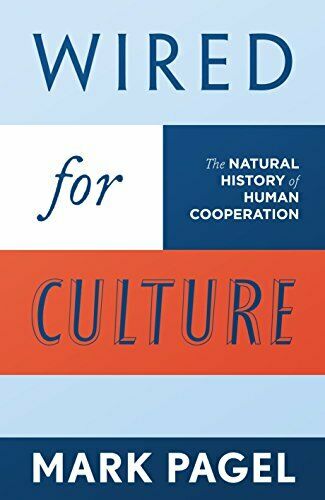Wired for Culture: The Natural History of Human Cooperation


Wow! Mark Pagel has written a really fantastic book here. This book has the kind of depth and breadth that is awe-inspiring enough to have an almost visceral impact. In exploring how we have evolved culture, or culture has evolved us, Pagel touches on a dizzying array of themes and concepts, never getting too complex or abstruse to follow, and always remaining both erudite and engaging.
And, in a way that reminded me of Arthur Koestler (in particular his excellent Sleepwalkers book), Pagel manages to make some pretty challenging ideas – challenging more to our sense of self (and other ‘cherished illusions’), rather than ‘difficult to understand’ – seem not just plausible, but likely.
In this respect Pagel shows that such scientific understanding as he is dealing in doesn’t necessarily suggest easy ways forward: how are we to square a growing awareness of the illusory nature of the self, along with ever clearer evidence that our access to truth, and even our ability to be author of our own responses to it, is far from what we’ve commonly assumed, with the tendency of the modern world towards a global culture, when biologically, i.e. genetically, our phenotypes (both physical and cultural) have been predominantly sculpted by the vastly longer timespans we’ve spent in smaller tribal groupings? He has answers, neither glib or simplistic, but you should read the book to find out what they are!
He frequently quotes or refers to authors like Dawkins, Dennett and Trivers (I had hoped Trivers’ recent book Deceit might be as satisfying a read as this has proven to be, and Pagel frequently refers to Trivers’ work on deception and self-deception, but I feel Pagel has brought together a broader, richer synthesis in this book), and like all three of these scientific (some might say ‘scientistic’) writers and thinkers, he uses Darwin’s evolutionary insights, chiefly the concept of natural selection, to address vast areas of great fascination, from how languages evolve (or resist change, for that matter), to such profundities as ‘what exactly is consciousness?’ Like these other writers he also demonstrates how, in Dennett’s terminology, Darwin’s dangerous idea is a seemingly ‘universal acid’, eating its way through all aspects of our understanding.
As well as addressing issues like truth and our relations with it, he looks into the origins and functions of art and religion (“beliefs take hold because they promote survival, not because they are true”), possible genetic as well as cultural roots for conflicted aspects of life in general and our being in particular, whose convoluted tendrils might ultimately manifest both in physical and psychological terms, and even why our societies have evolved to function as they do (with their vast disparities between innovation and copying, wealth and power). This really is an amazing, exciting and excellently written book.
Pagel also illuminates the incredible richness, although never glibly, of both what we’ve become and how, suggesting that, whilst in many ways things may not be as they first appear, nevertheless there’s much to admire, be thankful for, and work towards, not least of which is the understanding of our peculiar position as conscious cultural collaborators. Quite where to go from the point of finishing reading this, I can’t really say, as there’s a lot to absorb and reflect on.
In my view, with this book Pagel has stepped right to the forefront of the first rank of writers of popular science, with a superb account of how evolution creates culture and culture creates humans. The warp and weft of his argument and storytelling is densely and intricately interwoven, beautiful, illuminating and nigh on impossible to unravel.
I can’t wait to read more by this stimulating and engaging author… loved it! I just wish more books were so interesting and well-written. It’s an added bonus that this Allen Lane hardback has also been beautifully designed, typeset and printed.
